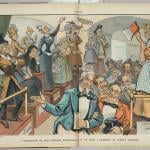Bacevich is scathing regarding the national security apparatus: The “national security state” continues, he says, “because, by its very existence, it provides a continuing rationale for political arrangements that are a source of status, influence, and considerable wealth. Lapses in performance by this apparatus might logically raise questions about whether or not the United States would be better off without it. Instead, failures inspire new efforts to reorganize and reform, which almost invariably translate into further institutional expanson. The more... Read more














